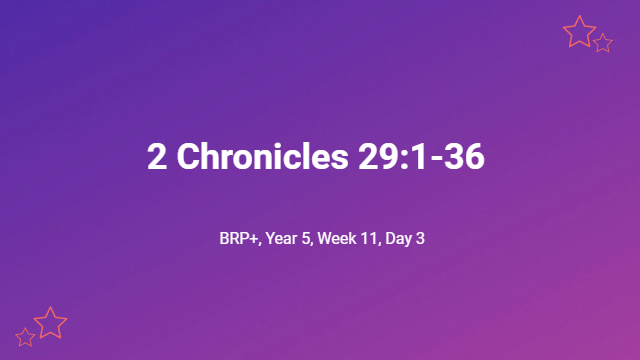2 Chronicles 29:1-36
Q.1. How did Hezekiah respond to God’s judgment differently from the way his father did? Where did the revival begin? How did they prepare for God’s blessing? – (2 Chr.29:1-19)
Hezekiah had written the Word of God in his own hand (Dt.17:18 & 19). He had come to very different conclusions about the decline of his father’s generation – For our fathers have been unfaithful and have done evil in the sight of the Lord our God, and have forsaken Him and turned their faces away from the dwelling place of the Lord, and have turned their backs … Therefore the wrath of the Lord was against Judah and Jerusalem, and He has made them an object of terror, of horror, and of hissing, as you see with your own eyes (2 Chr.29:6 & 8). As he read the Scriptures, revival began in his heart – Now it is in my heart to make a covenant with the Lord God of Israel, that His burning anger may turn away from us (2 Chr.29:10). Hezekiah reminded the Priests and Levites of their responsibilities to consecrate themselves and the sacred vessels for worship – They assembled their brothers, consecrated themselves, and went in to cleanse the house of the Lord, according to the commandment of the king by the words of the Lord (2 Chr.29:15).
Q.2. Why were blood sacrifices made? How did Hezekiah make the national reconciliation memorable? – (Dt.29:20-30 c.f. Lev.4:13-21)
The Priests carefully observed all that was necessary for the cleansing of the Temple. Blood sacrifices were made in order to satisfy God’s wrath – The priests slaughtered them and purged the altar with their blood to atone for all Israel, for the king ordered the burnt offering and the sin offering for all Israel (2 Chr.29:24). As we frequently still find, revival was not complete without memorable music as part of the worship. Hezekiah – stationed the Levites in the house of the Lord with cymbals, with harps and with lyres, according to the command of David and of Gad the king’s seer, and of Nathan the prophet; for the command was from the Lord through His prophets (2 Chr.29:25).
Q.3. What was the response of the people to Hezekiah’s initiatives? How far had the nation drifted from God? What impact did the revival have on God’s people? – (Dt.29:31-36)
Hezekiah encouraged his people to prepare their own hearts towards God – … And the assembly brought sacrifices and thank offerings, and all those who were willing brought burnt offerings (2 Chr.29:31). However, the nation had stopped supporting the priesthood, and many were unfit to make sacrifices – But the priests were too few, so that they were unable to skin all the burnt offerings; therefore their brothers the Levites helped them until the work was completed and until the other priests had consecrated themselves. For the Levites were more conscientious to consecrate themselves than the priests (2 Chr.29:34). David had previously set aside the Levites for music and worship after the tabernacle had been brought finally to Jerusalem. Some of their roles had become obsolete. Very likely, when sacrifices had ceased, the Levites had still kept up with their music and worship. Regardless, the impact of the revival was dramatic and – Hezekiah and all the people rejoiced over what God had prepared for the people, because the thing came about suddenly (2 Chr.29:36).

